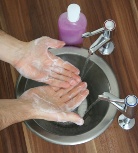 First we found out that they were no better than normal, less expensive soap. Then we found that they don’t prevent infections any better than normal soap. Now we find that certain antibacterial chemicals in them might impair muscle function. Should you buy antibacterial soap? The evidence so far would indicate: no.
First we found out that they were no better than normal, less expensive soap. Then we found that they don’t prevent infections any better than normal soap. Now we find that certain antibacterial chemicals in them might impair muscle function. Should you buy antibacterial soap? The evidence so far would indicate: no.
The best health advice for spreading infectious viruses is to wash your hands regularly. This has been proven without a doubt. This single act alone could help keep our most disease-infested environments (hospitals) cleaner and safer for patients. But what does that soap need to be? Does it need to have agents that fight bacteria?
PLUS: Do This One Thing to Prevent Many Diseases
A decade back, a major study confirmed what was widely speculated: antibacterial soaps are no better than plain soaps. It found that, among over 200 families, antimicrobial and plain soaps reduced the same number of microbes on hands. At the time, up to two-thirds of all hand cleansers in stores were antibacterial.
A pointed study in 2007, in the Journal of Clinical Infectious Diseases, found that new-age hand soaps could pose a health risk. Reviewing 27 studies, researchers concluded that antibacterial soaps A actually do more harm than good by counteracting other antibiotics we use. The study targeted soaps that contained “triclosan,” a common antiseptic agent. It found that antibacterial soaps kill some bacteria on our hands, but not all. The leftover bacteria then can become resistant to our antibiotics.
When that happens, a bug becomes far more powerful (and harder to treat) than it once was. It also makes bacteria such as amoxicillin resistant to antibiotic drugs. That can spell serious problems for people who have an illness requiring these drugs. They may not work.
Then, just recently, researchers have found that antiobiotic products like soap that contain triclosan can actually lead to impaired muscle function. A study found that triclosan can slow down the rate that fish can swim, reduce the muscle strength in mice, and, in human cells, hinder muscle contraction at the genetic level. So this just winds up adding more fuel to the fire.
Conversely, no evidence says that plain soap can’t limit bacteria on the hands any less than antibacterial soap. Maybe “plain Jane” soaps are the way to go, the ones we’ve been using forever until the decade where we started panicking over bacteria.
